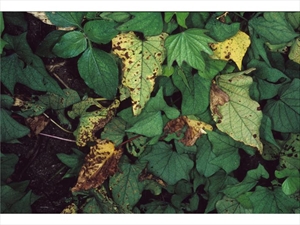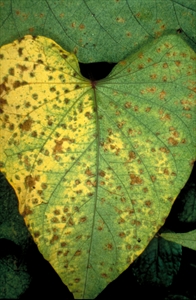Sweetpotato leaf spot
Pacific Pests, Pathogens and Weeds - Online edition
Pacific Pests, Pathogens & Weeds
Sweetpotato leaf spot (208)
Pseudocercospora timorensis
Asia, Africa, the Caribbean, Oceania. It is recorded from American Samoa, Federated States of Micronesia, Fiji, Kiribati, Palau, Papua New Guinea, Samoa, Solomon Islands, Tonga, and Vanuatu.
Sweetpotato, and other Ipomoea species.
Leaf spots are brown, circular to irregular on the upper surface, sometimes with light brown centres (Photos 1&2). As the spots grow, some join together. On the lower surface, the spots are brown or grey, but their shape is not well defined. Usually, the spots occur on mature leaves.
The spores occur mostly on the spots on the underside of the leaf, and are spread by wind.
The fungus that causes the leaf spots mainly damages old leaves, so it is unlikely that it causes a disease of economic importance.
Look for the brown circular to irregular spots on the older leaves, some joining together.
The leaf spots are usually on the older leaves, so it is unlikely that they cause a disease of economic importance by reducing storage root yields. Therefore, control measures are not considered necessary. If they are, test the tolerance of different varieties.
AUTHOR Grahame Jackson
Information (and Photo 1) Kohler F, et al. (1997) Diseases of cultivated crops in Pacific Island countries. South Pacific Commission. Pirie Printers Pty Limited, Canberra, Australia.
Produced with support from the Australian Centre for International Agricultural Research under project PC/2010/090: Strengthening integrated crop management research in the Pacific Islands in support of sustainable intensification of high-value crop production, implemented by the University of Queensland and the Secretariat of the Pacific Community.





